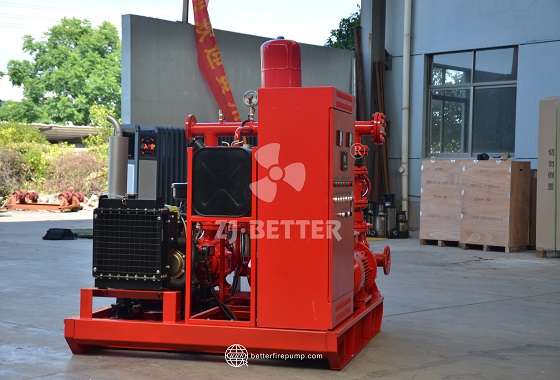With the rapid development of modern urbanization and industrialization, the demand for fire water supply systems is increasing. Whether it's high-rise buildings, large factories, warehouses, logistics parks, or public infrastructure, a stable and reliable fire water supply is essential. Traditional fire pump systems often face challenges during installation and maintenance, such as long installation times, large footprints, and complex repairs. Modular fire pump systems were developed to address these challenges. Through an integrated, standardized, and flexible design, they offer users a new solution that is easy to install, efficient to operate, and simple to maintain. This article will provide an in-depth analysis of modular fire pump systems from ten perspectives to help users fully understand their performance and value.
1. Advantages of Modular Design
Modular fire pump systems utilize a standardized functional module system, including the pump module, power module, control module, and accessory modules. Each module is precisely designed and independently tested to ensure efficient and interoperable operation after assembly. This structure not only shortens installation time but also enhances system flexibility. When expansion or upgrades are needed, users can simply add the corresponding module without undergoing major system modifications, significantly improving adaptability.
2. Flexible Installation and Space Savings
Traditional fire pump sets require extensive civil engineering work and occupy a large area during installation. Modular fire pump sets, however, feature an integrated base design, with modules connected via standard interfaces. This significantly reduces installation complexity and space requirements. They can be easily deployed even in basements, equipment rooms, or confined spaces. Furthermore, the flexible layout allows users to choose horizontal or vertical arrangement based on actual operating conditions, making the most of limited space.
3. Convenient Transportation and On-site Commissioning
Modular fire pump sets are typically largely assembled and tested in the factory, ensuring they are ready for operation upon arrival. The separate design of each functional module facilitates transportation, adapting to varying transport conditions and avoiding overload issues. On-site installation requires only interface connection and system commissioning, significantly shortening the construction cycle and making them particularly suitable for projects requiring rapid delivery.
4. Efficient and Stable Operation
Modular fire pump sets offer not only structural flexibility but also superior performance. Their core pump body utilizes a highly efficient hydraulic model, while the powertrain can be driven by either an electric motor or a diesel engine, depending on user needs. Combined with the intelligent control module, the entire system enables automatic start-up, automatic switching, and real-time monitoring, ensuring a stable, high-pressure water flow immediately upon fire, ensuring timely and effective firefighting operations.
5. Intelligent Control System
Modern modular fire pump sets are commonly equipped with an intelligent control cabinet, which provides real-time monitoring of the pump set's start-up and shutdown, flow rate, pressure, and operating status. Users can view operating parameters via the display or remote system, and even implement remote alarms and remote operation. This not only improves system safety and reliability but also reduces manual oversight costs, aligning with the development trend of smart firefighting.
6. Easy Maintenance and Repair
One of the greatest advantages of the modular design is ease of maintenance. Each module can be independently disassembled and replaced, allowing for local repairs without shutting down the entire system. For example, if a power module fails, a spare module can be quickly replaced, minimizing interruption in the fire water supply. Furthermore, the modular structure makes spare parts management more efficient and reduces downtime.
7. Adaptability to Various Application Scenarios
The flexibility of modular fire pump sets enables their widespread application in various engineering scenarios. From high-rise residential buildings and commercial complexes to petrochemical plants and power facilities, and even public spaces like airports and subways, modular fire pump sets can be flexibly configured to meet specific needs. Whether it's industrial sites requiring high-flow water supply or residential buildings requiring energy conservation and compact layouts, modular fire pump sets offer tailored solutions.
8. Energy-Saving and Environmentally Friendly Features
With energy conservation and environmental protection gaining increasing importance, modular fire pump sets significantly reduce energy consumption by optimizing hydraulic models and power configurations. Some systems also support variable frequency control, automatically adjusting operating status based on actual demand and avoiding energy waste. Furthermore, the modular structure reduces unnecessary resource consumption during production and transportation, demonstrating environmental benefits throughout its lifecycle.
9. Compliance with International Standards and Certifications
The modular fire pump sets are designed and manufactured in strict compliance with international fire protection standards and quality certifications, such as NFPA, ISO, and local fire codes. Standardized modules not only ensure product consistency and interchangeability, but also facilitate export and cross-regional application. Users can rest assured that their fire protection systems meet authoritative certification standards, enhancing the overall project safety level.
10. Future Development and Application Prospects
With the development of smart cities and intelligent buildings, modular fire pump systems will see even broader application prospects. In the future, their control systems will further integrate with the Internet of Things, big data, and cloud platforms to enable remote management and intelligent predictive maintenance. Furthermore, modularity will continuously optimize product production models and supply chains, making fire pump systems more efficient, reliable, and intelligent.
Modular fire pump systems not only address many of the installation, maintenance, and expansion challenges of traditional fire pump systems, but also, with their efficient operation, intelligent control, and flexible adaptability, they are an ideal choice for modern fire protection systems. They represent the future of fire water supply equipment and provide a stronger foundation for building safety and public fire protection. For project contractors, equipment operators, and end users, modular fire pump systems are a cost-effective and practical choice.
